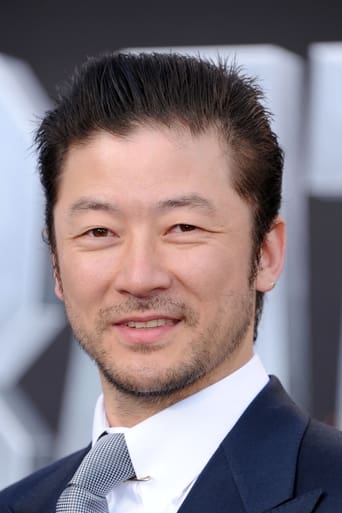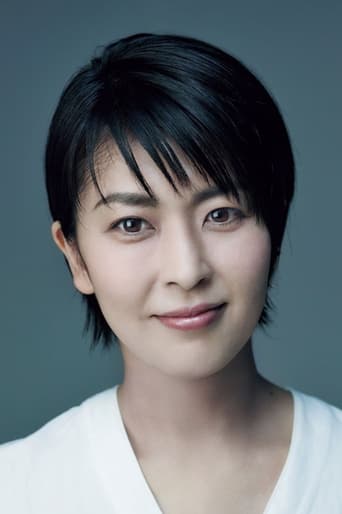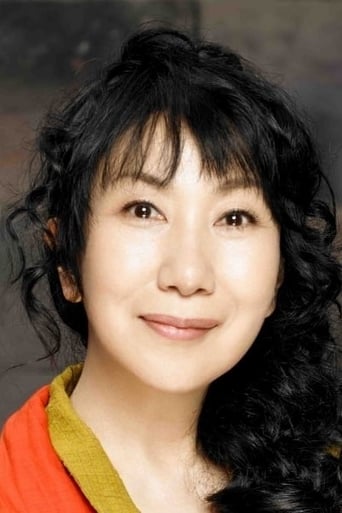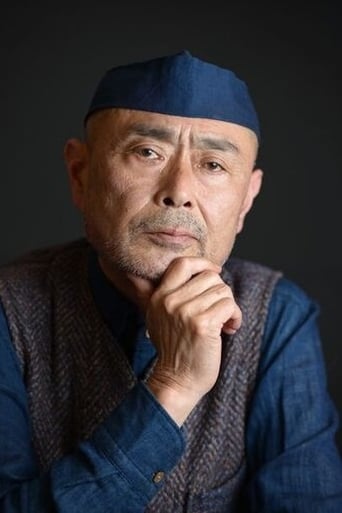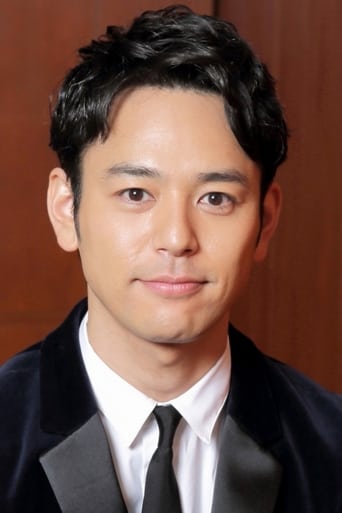StyleSk8r
At first rather annoying in its heavy emphasis on reenactments, this movie ultimately proves fascinating, simply because the complicated, highly dramatic tale it tells still almost defies belief.
Deanna
There are moments in this movie where the great movie it could've been peek out... They're fleeting, here, but they're worth savoring, and they happen often enough to make it worth your while.
Philippa
All of these films share one commonality, that being a kind of emotional center that humanizes a cast of monsters.
ihrtfilms
This is quiet little Japanese film about Otani, a writer with a drink habit and a loving, yet long suffering wife, Sachi. He owes money to a bar and so she goes to work there until the debt is paid back, only to realise that not only does she bring the bar business, she also enjoys working. The money gets paid off and she stays on working and earning money, all the while her husband keeps drinking.Things change however when a young man, a fan of the writer falls for the wife and to add to the story there is a young woman enamored with the writer. Throw in a failed suicide pact and you have quite a drama. Except, despite the potentially heavy story lines, this is handled with a lighter touch. The husband, whilst unfaithful and a drunk actually has some softness to him which makes it difficult to dislike him as clearly the wife thinks. The are brief flashbacks to previous relationships suggesting that perhaps what they have is the best they can have. Because it never become to heavy going, it therefore never becomes emotional and in fact it is quite charming and often funny during much of the film.The two leads are both very good and the film with it's recreation of postwar Tokyo is excellent. Otani, is in any other world a despicable man,but because Sachi has the will power and strength she really has the upperhand and she makes the choices that bind them. This turns the film from a heavy going melodrama to a lighter one and one that shows that sometimes love does endure.More of my review at my site iheartfilms.weebly.com
cucina
This is an engrossing, well made and well acted film.There is, however, a static quality to it that quickly becomes tedious. Within the first five minutes you know everything there is to know about the two lead characters: at the end of the film they are exactly the same. The husband, superbly played by Asano Tadanobu, is a spoiled, selfish, deceitful and self-pitying alcoholic writer. His beautiful and passive wife, played by Matsu Takako, is loving, forgiving, accepting and, ultimately, masochistic.Both these characters are prototypes: the tortured artist and the self sacrificing, long suffering wife. At times his overwhelming lack of basic decency is almost comical. And her ever present gentle smile and gracious acceptance of his sadistic behavior and treatment -- not only of her, but of their child -- makes her increasingly appear not as an admirable woman but an enabling fool.As the emotional abuse and mistreatment accumulate, the entire plot focuses on a single, simple question: will the wife at least acknowledge to herself the demeaning and brutal reality of her marriage, or will she continue to smile and accept her monster of a husband. The smile wins.
sitenoise
This film made me crazy. It's a good film, very well acted with some poetic dialog sprinkled throughout, but it's also some of the worst Orientalist horror imaginable. But that's weird because it's a Japanese film, by a Japanese director, based on a short story by a Japanese writer. "Villon's Wife" is the name of the story the film is based upon, and the film is about a wife but there's nobody named Villon in it. If you run the Japanese sub-title, 〜桜桃とタンポポ〜, through Google translation it returns "Cherry and dandelion", which might seem a little abstract but it has a lot more to do with the movie than "Villon's Wife" and actually takes a bit of the sting out of what comes off as the debatable center of attention and refocuses it on what really matters.On the surface this is a film of questionable merit about a long-suffering and loyal wife, named Sachi, to a cheating, thieving, alcoholic husband named Otani. They have a two year old child. Otani is a writer and an attempt is made to give his awful ways a pass by portraying them as self-destructive in that poetic way only artists can be, and be loved. He characterizes the owners of a local pub, where Sachi is working to pay off his debt, as "mercenaries" who feed him liquor so they can profit off him. That's the twisted logic of a drunk. He says things like "Distant yet close, are man and woman", and "Women know neither joy nor grief ... men know only grief. They are always fighting fear". Goodness.Which brings us to cherries and dandelions. Otani has written a dandelion story, about "a dandelion's sincerity". The story moved a young factory worker, Okada, so deeply he begins stalking Otani but meets and falls in love with Sachi instead, quickly sussing Otani's ill-treatment of her. Over drinks with this would suitor be to his wife, Otani, as a self-reflective woe-is-me justification for his abuse of Sachi, says "I can't even love a dandelion the way I should. I want to pluck its petals, scrunch it in my fist ... stick it in my mouth..." Otani is suspicious of the relationship between his wife and the factory worker and, feeling like a cuckold, meets with one of his lovers who is portrayed as equally self-destructive (somehow, as a woman she is able to feel grief too, I guess), and they attempt suicide together. They fail. Sachi dutifully hires a lawyer, an old flame who is still in love with her, to defend Otani who is charged with the attempted murder of the girl. Sachi doesn't have any money and might have slept with the lawyer as payment.The film ends with Sachi trying to mend things with Otani who eating cherries that were given to him to give to his son. He acknowledges he is a terrible father. Sachi eats one of the cherries, says they are good and tells her husband that "Being a monster is fine. As long as at least we're alive, it's just fine." I wanted to pull my hair out.Japanese sexism may not be peculiar but it is certainly intense and complex. On first blush, Villon's Wife seems to be one big stereotype celebrating the loyal, subservient, and beautiful Japanese woman. And props must be given to Takako Matsu who plays Sachi. She is beautiful, beaming that stereotype loud and clear. Everyone in the film is portrayed as loving her. She is so radiant it might be hard to take your eyes off her and see what else is going on in the film. Villon's Wife is a period piece set in the late 1940s and all the characters seem self-destructive. The Japanese have lost the war and GI Joe is everywhere. When Sachi goes to meet with the lawyer who helped her husband, she first approaches a woman on the street who is applying red lipstick to entice GI Joe, and says "Please sell me your lipstick". The woman replies "A Yankee gave it to me. It's American." Sachi makes the woman an offer she can't refuse, applies the lipstick and goes in to see the lawyer. When she comes out, her hair ever so slightly disheveled, she sees the lipstick woman in the back of a Jeep with a few other women and a bunch of GI Joes. The woman is waving and saying "Good bye. Good bye". At first Sachi seems confused, but eventually smiles and returns the "Good bye". She sets the lipstick down in the grass and, with an apparent sense of shame (or empowerment?), wipes her hand across her lips.I don't really know for sure if this film is that smart and subtle, but if it's not, it's awful. I can't even say for sure what exactly the film is exploring or trying to say. It would help if I were Japanese, I think, and had read the source material but that kind of movie going is for college students. I can say that Villon's Wife presents itself as being a whole lot more than a simple character study of an abused but loyal wife. I blame the chosen English title for throwing me off. All of the performances are outstanding. Takako Matsu is brilliant and beautiful as Sachi. Asano Tadanobu was born to play the role of Otani and Ryoko Hirosue is wonderful in her bit part as his partner in the attempted Love-Suicide. All the characters are good and the film looks great. I'm not so creeped out any more, but be warned: watching this film at face value is a little troubling. If you don't look for deeper meaning it might not appeal.
Harry T. Yung
The setting is post-war Tokyo. The male protagonist is an eccentric young (thirtyish) writer obsessed with two notions: death and being cuckolded.The plot is simple but not without some interesting features, starting with the pathetic writer Otani running home (comprised of wife and 2-year-old son) half-drunk, after stealing 5000 yen from a small eatery, with the owner couple hot on his tail. That leads to the demure, devoted wife Sachi volunteering to work in the joint as "hostage" until the money can be paid back. As the story unfolds, the wife is delighted with find that her natural endearing charm immediately makes her the darling of the patrons who lose no time getting into a one-upmanship contest of giving her the largest tip (which the generous owners allow her to keep). At this point, the movie appears to take the route of a slightly off-beat comedy.More then is revealed about the husband, as a womanizer who manages to seduce every desirable woman that comes his way, including the wife of the owner of the joint. One of Otani's admirers, Akiko, has taken the obsession such an addictive extent that she has lost everything for him, and now comes to the joint most night to get drunk and hope to run across him. Further revelation comes with Sachi's change encounter with her girlhood sweetheart, now an established lawyer. The irony is that they broke up because during their deprived days, Sachi was caught shoplifting a scarf for his boyfriend, who deserted her when she was arrested while Otani, a strange, came to her rescue. Equally ironic is that Otani stole the 5000 yens so that his wife and child can have a good Christmas, a crime committed with similar compassionate motivations.The story meanders around these relationships until it takes a decisive turn, when Otani and Akiko come to a decision of committing suicide together. The episode is handled with black humour, but has grave consequences. Both survive, but Otani is charged with attempted murder of Akiko.It seem that in this semi-autobiography of Osamu Dazai (who actually killed himself two years after the story of published), the character Otani was custom-made for Tadanobu Asano whose work in the Asian cinematic world are too many to mention ( Last Life in the Universe, Café Lumiere, Zatoichi, Invisible Waves, Our Mother). Similarly for Takako Matsu as Sachi, the saintly enduring wife and mother. Ryoko Hirosue, who seems to be getting more versatile every time she appears on screen, gives a mesmerizing portrayal of beautiful, enigmatic Akiko.
